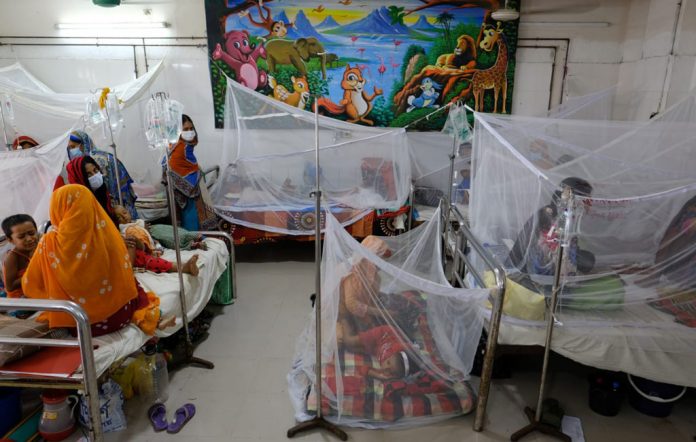The authorities have recorded the highest number of dengue positive cases outside Dhaka in August this year meaning the mosquito disease gripped the entire country.
“Dhaka city witnessed 53,489 dengue positive cases between January 1 and August 26 this year while 58,695 cases were reported outside Dhaka during the same period,” a statement of the Directorate General of Health Services (DGHS) said.
According to the health experts, since the outbreak of dengue in 2000, Dhaka recorded highest number of dengue cases and initially the vector-borne disease spread in the capital city.
But the dengue disease is gradually spreading across the country, they said adding 64 districts of the country have witnessed dengue positive cases.
According to the statistics of DGHS, August is being considered as deadliest month this year as the authorities logged 65,010 dengue cases and 305 deaths till today (August 28).
Dhaka saw 30,331 dengue positive cases between January 1 and August 1, 2023 while 24,085 cases were recorded outside Dhaka during the same period.
Bangladesh has been grappling to stem dengue outbreak as August was the deadliest month since detection of the mosquito-borne disease in 2000 while experts predicted the dengue situation may prolong this year, if the authorities fail to take prompt and effective measures to control the disease.
July alone recorded 43,854 dengue positive cases with 204 deaths, the DGHS statement read.
Talking to BSS, several entomologists said that dengue by now emerged as an epidemic as it spread all over the country but observed that the concerned agencies, particularly city corporations could not take required steps to annihilate mosquitoes.
Eight dengue patients died and 2,331 were admitted to different hospitals in the country during the last 24 hours till 8 am today (August 28).
“During the period, 918 dengue patients were hospitalised in Dhaka city while 1,413 were admitted to different hospitals outside Dhaka,” a press release of the Directorate General of Health Services (DGHS) said.
“This year, 556 deaths, the highest in a year since dengue was detected in 2000, were reported from dengue disease while 281 died last year,” the daily statement of the DGHS said.
According to hospital authorities, pressure of dengue patients have decreased slightly in healthcare facilities in Dhaka city meaning dengue situation is in decreasing trend in the capital city while the number of dengue cases are increasing outside Dhaka city.
“On an average, 600 dengue patients were getting admission to Mugda Medical College Hospital every day since the beginning of July . . . huge pressure from dengue patients for admission continued till mid-August,” Director of Mugda Medical College and Hospital Dr Md Niatuzzaman said.
“Almost 50 percent pressure from dengue disease has reduced in Mugda Medical College Hospital since mid-August,” he said adding pressure of hospitalization of dengue patients as well as dengue tests have decreased in the past two weeks.
Since the beginning of July this year, dengue disease has been increasing alarmingly and this increasing trend continued till second week of August, the Mugda hospital chief said adding, “We have expanded treatment facilities including dengue dedicated unit to cope with increased number of dengue patients.
According to the experts, August and September are normally considered as peak months for dengue outbreak, but the peak period was extended till November last year.
They predicted that the ongoing dengue outbreak may prolong till November as a large number of Aedes mosquitoes are grown this year while met office forecasted that rainy weather is likely to extend all through the months of October and November.
Other health experts focused on taking massive efforts to avert dengue epidemic as the mosquito-borne disease is taking an alarming turn with recording significant number of dengue patients and deaths in Bangladesh particularly in rural areas.
“All relevant organizations should take urgent initiative to control dengue outbreak as Bangladesh is in the grip of dengue disease,” Director of The Institute of Epidemiology, Disease Control and Research (IEDCR) Prof Dr Tahmina Shirin said.
She said, “Community engagement is very crucial to control dengue disease. Every household in major cities has to be brought under daily surveillance to destroy any potential sources of Aedes mosquito.”
The IEDCR Director said people’s awareness is also a crucial factor particularly in urban areas to bring the mosquito-borne viral disease under control, the prevalence of which has risen sharply in the country this year.
Tahmina described community mobilization as the most effective initiative to control dengue outbreak. She laid emphasis on taking integrated efforts to tackle dengue disease and said that it is impossible for a single institution to handle the menace. -BSS





























